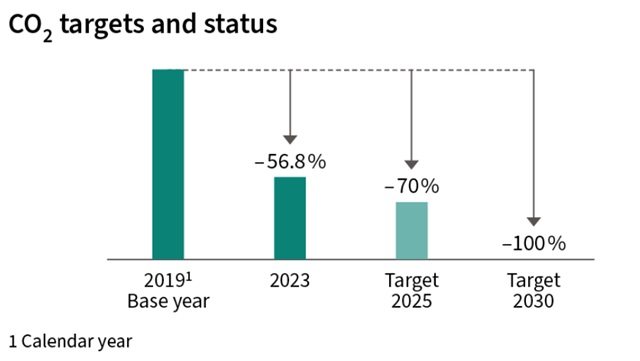Infineon's climate strategy rests upon two fundamental pillars: the continuous reduction of its own emissions and the proactive role played by Infineon, along with its innovative products and solutions, in contributing to climate protection. Having achieved a commendable reduction of 56.8% in emissions to date compared to the 2019 baseline, the company attributes this success to implementing smart abatement concepts, energy efficiency programs, and the transition to green electricity in Europe and North America.

Credit: Infineon
Anticipating a further reduction of emissions by 70% from the 2019 levels by 2025, Infineon is steadfastly progressing towards carbon neutrality by 2030, specifically addressing its direct and indirect energy-related emissions (Scope 1 and 2). Demonstrating heightened ambition, the company extends its climate protection efforts to include the supply chain (Scope 3). This expansion involves close collaboration with supply chain partners, emphasizing improving data availability and accuracy.
Elke Reichart, Chief Digital Transformation Officer and Sustainability Head at Infineon, underscores the company's commitment to decarbonization, emphasizing the importance of collaboration across the entire value chain, transparent and comprehensive data, and adherence to global standards to tackle climate change.
Remarkably, while doubling its revenue since 2019, Infineon has concurrently halved its CO2 emissions (Scope 1 and 2). This achievement is attributed to energy efficiency measures, robust perfluorocarbon (PFC) abatement initiatives, and the pivotal shift to renewable energy sources. Notably, key manufacturing sites in Kulim and Melaka of Malaysia have transitioned to green electricity in 2023, aligning with the earlier adoption of renewables in European and North American sites in 2021 and 2022, respectively.
Infineon aligns its climate targets with the Science Based Targets initiative (SBTi), recognized as a benchmark for ambitious climate action in the private sector. SBTi provides companies with a well-defined pathway to reduce greenhouse gas (GHG) emissions under the latest climate science, aligning with the objectives of the Paris Agreement to limit global warming to well below 2°C above pre-industrial levels and striving to cap it at 1.5°C. SBTi operates as a collaborative effort between the Carbon Disclosure Project (CDP), the United Nations Global Compact, the World Resources Institute (WRI), and the World Wide Fund for Nature (WWF).




